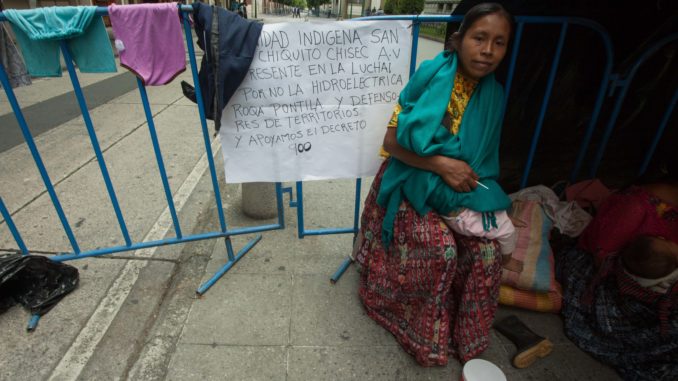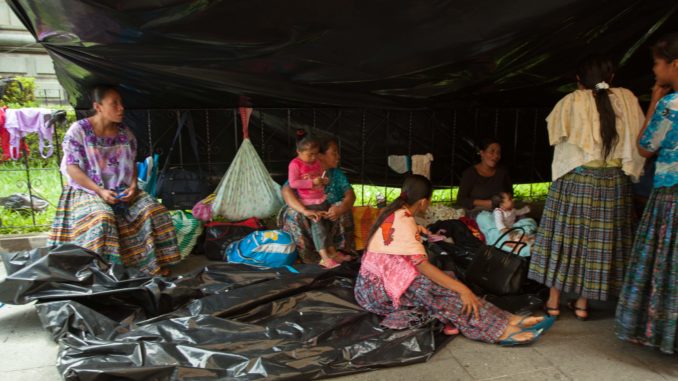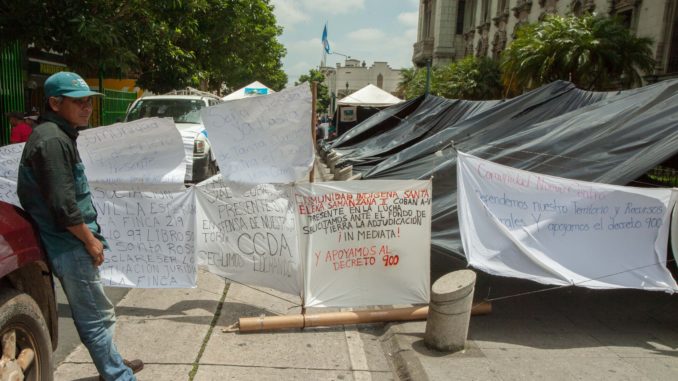
On August 8, one hundred Q’eqchi Maya families from the Department of Alta Verapaz arrived to the historic center of Guatemala City, the nation’s capital, to establish a permanent presence in an encampment near the Presidential Palace. They have announced that they will remain there until the administration fulfills the agreement between the campesino communities and the government established in April 2015 to end agrarian conflicts within the department.
“We are here in front of the National Palace because of the failure of the state to comply with the accords that came after many dialogues with state officials on the land conflicts in Alta Verapaz,” said Carlos Choc, a member of a Q’eqchi community within the Municipality of Coban, Alta Verapaz, and a representative from the Comité Campesino de Altiplano (CCDA), the organization that coordinated the occupation.
“To this date, we do not have a response that is the benefit of the Q’eqchi communities,” Choc told Toward Freedom. “Because of this, our Q’eqchi communities have risen up to demand that [President Jimmy Morales] comply and give us a favorable response. We do not want any more dialogues on the conflict over land.”
Black plastic tarps hang from ropes tied to the Guatemalan National Palace, creating a series of makeshift tents that have become the home for these families. At the entrance of the encampment hang hand written signs decrying the continuation of violent evictions and the expansion of mega-projects within the Q’eqchi territories.
Government officials from the office of President Morales approached the campesinos on August 11, just days after the establishment of the encampment. The officials offered a dialogue with CCDA over the conflicts.
According Leslia Artola from the CCDA, the government agreed to respect the accords signed in 2015, and the resolution of land conflicts in certain communities in the next three months.
“We arrived to an accord that will resolve the conflicts in several communities,” said Artola. “These are a route for the communities to finally resolve the conflicts. It is because of our pressure on the state that we are seeing a path to resolution.”
She adds that there is still no guarantee that the state will follow through with the agreement.
“But if in three months the conflicts are not resolved,” Artola explained, “then we will be back here in front of the palace demanding the state respect the agreements.”
In April 2015, CCDA and the residents of Alta Verapaz carried out a similar action in the same spot to demand a dialogue with then President Otto Pérez Molina over the land conflicts in the department. The protest called on the administration to end the eviction in the region. The high-level meetings between representatives from CCDA, the President, and other officials from the Minister of Agriculture, Ranching, and Alimentation and the National Land Fund, among others, ended with officials agreeing to resolve the conflicts in 40 communities.
The Guatemalan congress passed Accord-181 which provided 13 million Quetzales, or about 175,000 dollars, to the communities of Finca las Conchas, Finca Ixloc San Pedrito and the community of San Juan los Tres Ríos, in Cobán, Alta Verapaz to resolve the conflicts there. This money was to be provided through the National Land Fund. But to date, the communities have not seen any of the money.
The administration of Pérez Molina also agreed to pursue a national law that would support small farmers. But the state has carried out no actions to promote any sort of agrarian reform.
“We are seeking solutions to the 40 agrarian conflicts [in Alta Verapaz],” said Choc. “It is because of this that we are here. We’ll be here until we receive a response that is favorable to the communities, then we will go back to our homes in our communities.”
Many of these communities have a long history on the land, but they remain under the shadow of ongoing conflicts over land ownership in the region.
“Some of these communities have been there for decades,” said Artola. “For example, Ixloc San Pedrito has been on that land for over 80 years. But there are three finca owners that are claiming that the land is legally theirs. These finqueros are both former military and foreigners.”
But as of August 2017, these promises remain unfulfilled, triggering the occupation and calls for the fulfillment of the accords. In 2015, Congressional Deputy Leocadio Juracan from the left-wing Covergencía political party, then the national coordinator of CCDA, had warned during the occupation in 2015 that “if the government fails to follow the agreement, we will be here once again with thousands of people.”
Over two years later, the occupation was renewed, as communities became frustrated with the failure of the state to resolve these conflicts over land.
Repression Against Communities

The agrarian conflict in the community of San Juan Tres Ríos was one of the main cases that the CCDA sought to find a solution to back in 2015. Since 2012, the community has sought to obtain the legal titles for the land where they have lived for decades. But this community has faced violence in the years that followed the protest.
In April 2015, as the leadership of CCDA was negotiating with the administration of Otto Pérez Molina, the community was violently evicted from their land. The residents were given a two-hour window to collect their belongings before leaving. Following the negotiations, the government stated that they would resolve the conflict.
In June 2016, community leader Daniel Choc from San Juan Tres Ríos, was shot repeatedly and killed by unknown assailants. Just a year earlier, Choc was one of the many campesinos that traveled to Guatemala City in 2015.
“We are defending our right to our territory,” said Choc in an interview conducted by this reporter during the occupation in 2015. “We are not going to leave when the finca owners or foreign companies come and occupy our land. They say that we are invaders of the land, but no, we are the legitimate owners of this country. The land is ours; they are the invaders of the land, because they come from other countries and take our rights to our land.”
CCDA was quick to denounce the assassination of Daniel Choc.
“CCDA has…strongly condemned this heinous act, and blames state institutions for its lack of effectiveness in resolving agrarian land conflicts afflicting communities in the states of Alto and Baja Verapaz,” wrote representatives of CCDA in response to the assassination. “CCDA publicly denounces the inefficiency and lack of interest by state institutions, who are responsible for solving these situations, thereby causing all kinds of violent situations to which communities are subjected daily.”
The community had regularly faced intimidation and threats from Finca Rancho Alegre, a finca near the community. Residents denounced these threats to the Alta Verapaz Regional Office of the Human Rights Ombudsman’s Office.
Following the assassination, CCDA called on the government to replace the public officials for their failure to resolve the land conflict.
“We ask for the urgent dismissal of the authorities in charge of agricultural institutions in the country for their inability to guarantee the fulfillment of human rights and the rights of indigenous peoples,” wrote representatives of CCDA in another press statement.
There has not been an investigation launched into the assassination.
“Daniel Choc died as a result of this struggle for the land,” said Carlos Choc. “Because of the fact that the state failed to respond, and this comrade continued the struggle, he was sadly killed. As of the moment, there has been no advancement in the case.”
According to Artola of the CCDA, the community still lives under the threat of yet another violent eviction.
Land Conflicts and Poverty

From the Spanish conquest to the CIA-backed coup against leftist President Jacobo Arbenz in 1954, Guatemala has suffered from a series of conflicts over land.
Today, land remains at the center of social conflicts across Guatemala, with just three percent of the population owning over 80 percent of arable lands. The plans developed by the Trump administration do little to resolve inadequate land distribution, and little to include indigenous communities. These continued agrarian land conflicts are exasperated by the expansion of the production of African palm oil, as well as the continued construction of hydroelectric projects, and mining interests.
“Our communities are facing a delicate situation,” Artola. “Their struggle in defense of our natural resources, the struggle against oil companies, against the hydro projects the struggle against the advancement of African palm oil production, and the mining companies that are entering our territory. They are destroying our territory, and leaving us without water.”
The continued dispossession and conflict over land directly contributes to the crisis of poverty within the country, as well as influence the processes of internal and external migration.
Poverty has grown in the two decades since the end of Guatemala’s 36-year-long internal armed conflict. The rise in poverty comes after years of decline. According to World Bank data, in 2000, 56 percent of the population lived in poverty. Today, over 60 percent of the population suffer from poverty, the majority of which live in rural areas.
This rise in poverty especially impacts children, with 68 percent of children under six years of age living in poverty, and suffering from hunger. Guatemala has among the worst rates of childhood malnutrition. According to data from the United Nations, Guatemala is the worst level of childnhood malnutrition in Latin America, and the sixth worst globally.
These issues especially hit the indigenous communities harder than others, given the historic racism and exclusion of indigenous populations. In fact, departments with high indigenous populations have higher levels of poverty than other departments.
At the occupation in Guatemala City, the campesinos see this failure of the state to respond the agrarian conflict as only contributing to the continuation ofsocial division.
“The Government is not giving a response that will lead to the resolution of these conflicts,” said Artola. “They are adding more wood to the fire that will only lead to more social conflicts.”
Jeff Abbott is an independent journalist currently based out of Guatemala. His work has appeared at The Progressive, In These Times, and North American Congress on Latin America. Follow him on Twitter @palabrasdeabajo.
